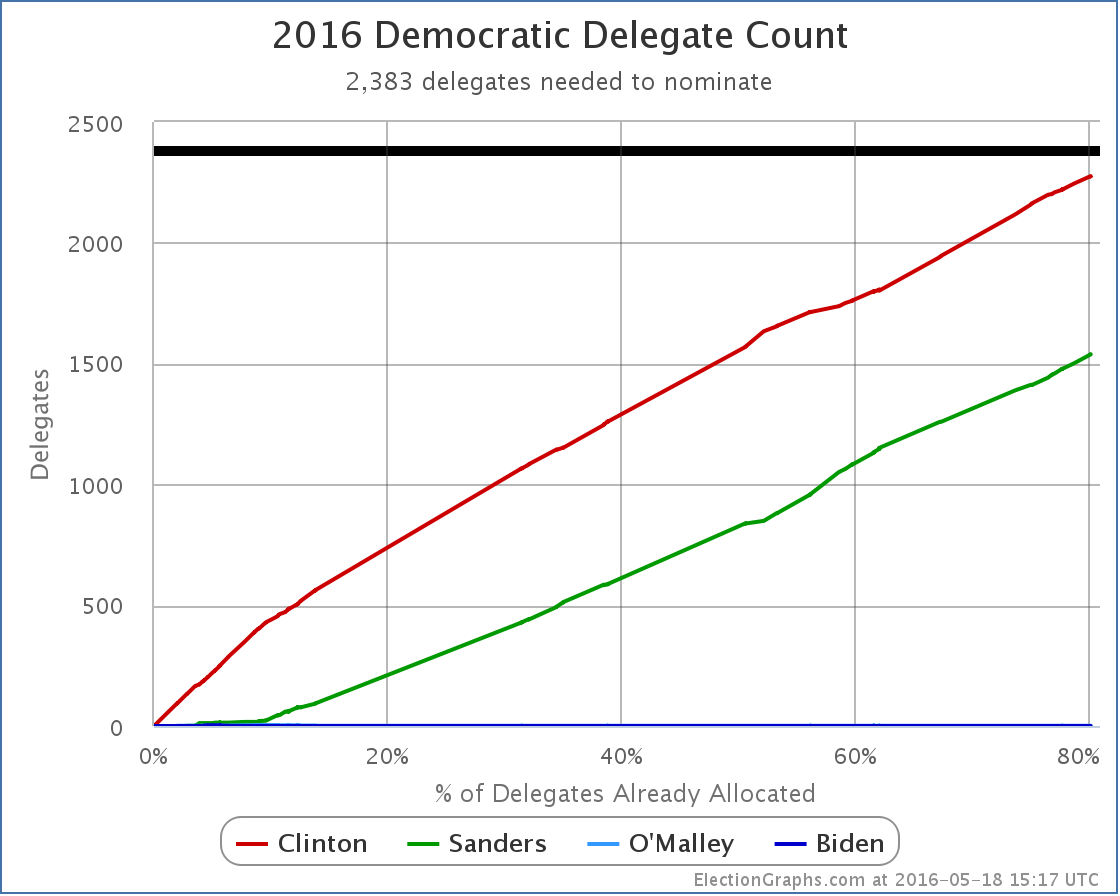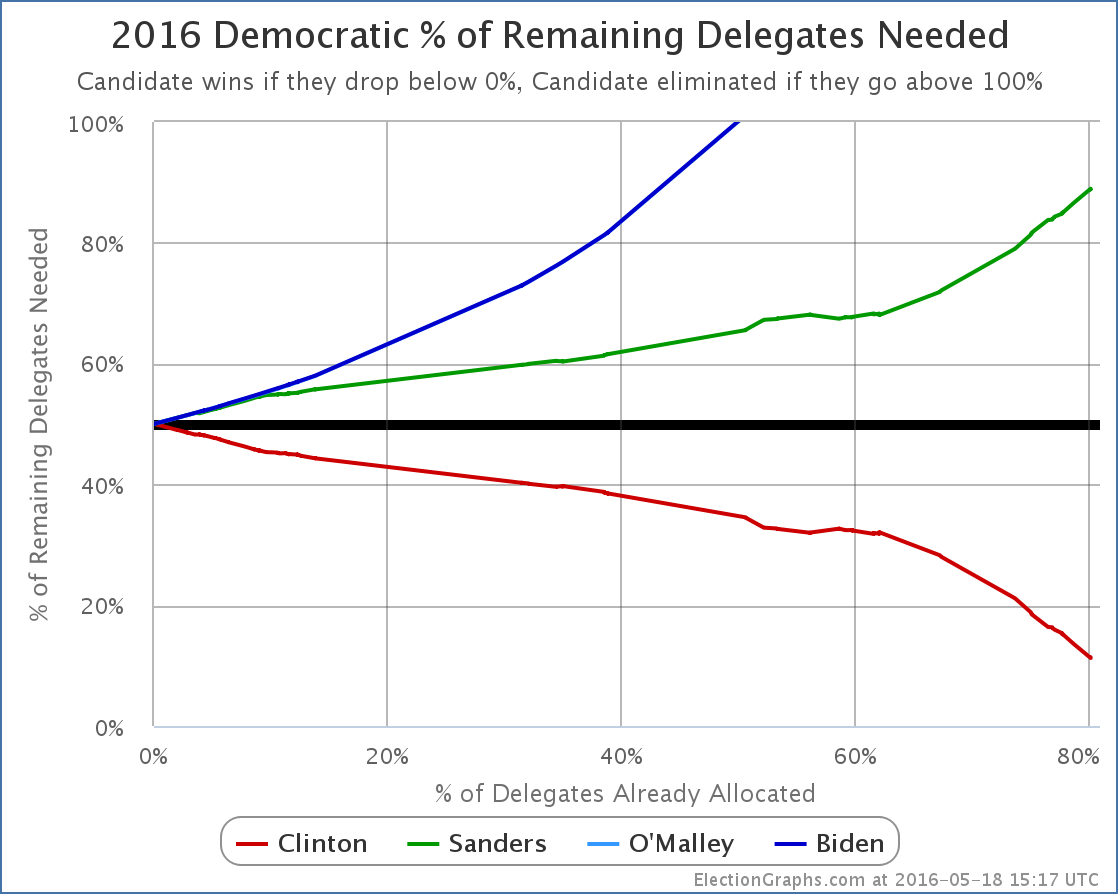With the final results all but inevitable, these updates will be somewhat mechanical absent something unexpected happening.
After West Virginia, Sanders needed 84.90% of the remaining delegates to win, Clinton only needed 15.29%.
In Oregon and Kentucky, Sanders got 62, Clinton got 54.
In other changes since West Virginia due to superdelegate updates, there was a net change of Clinton +1, Sanders -1.
So total change since West Virginia: Sanders +61, Clinton +55.
That is Sanders 52.59%, Clinton 47.41%.
So Clinton met her target, Sanders did not.
Updated graphs:
New delegate totals: Clinton 2275, Sanders 1539, O’Malley 1.
There are 950 delegates left. Clinton needs 108 of them. Sanders needs 844 of them.
Clinton now needs 11.37% of the remaining delegates to win. Sanders needs 88.84%.
Update 2016-05-20 16:33 UTC: Superdelegate scan – Clinton +2, Sanders +2.
Update 2016-05-25 02:26 UTC: Superdelegate scan – Clinton +3.
Update 2016-05-25 02:28 UTC: Change from Maryland – Sanders +1, Clinton -1.
Update 2016-05-27 17:05 UTC: Superdelegate scan – Clinton +7, Sanders +1.
Update 2016-05-30 16:06 UTC: Superdelegate scan – Clinton +4, Sanders -1.
Update 2016-06-03 14:20 UTC: Superdelegate scan – Clinton +4, Sanders +3
Update 2016-06-03 14:22 UTC: There was a one delegate adjustment from Clinton to Sanders in Oregon as results were finalized there. I also discovered one Sanders delegate in Michigan I was missing due to a math error on my part which is now fixed. Net change: Sanders +2, Clinton -1.
Update 2016-06-05 03:25 UTC: Superdelegate scan – Clinton -1
Note: This post is an update based on the data on ElectionGraphs.com. Election Graphs tracks both a poll based estimate of the Electoral College and a numbers based look at the Delegate Races. All of the charts and graphs seen in this post are from that site. Additional graphs, charts and raw data can be found there. All charts above are clickable to go to the current version of the detail page the chart is from, which may contain more up to date information than the snapshots on this page, which were current as of the time of this post. Follow @ElectionGraphs on Twitter or like Election Graphs on Facebook to see announcements of updates or to join the conversation. For those interested in individual general election poll updates, follow @ElecCollPolls on Twitter for all the polls as they are added.
Edit 2016-06-05 05:44 UTC: Corrected a couple details of the list of superdelegate updates to match my logs of the changes that were made. I’d missed logging a couple of the updates here on this post. Dated the updates to approximately when I made the changes.


Well, headline is misleading (not the text). Metric is not specified for the word “counts” unless one already knows that the site limits its scope to best prediction of the nomination outcome. So correct if “counts” references means the Boolean metric of getting the majority of delegates (either pledged or full set) and thus “winning the nomination.” Likely wrong or at least debatable if the metric is how much support is demonstrated from supporters before the convention & the resulting prospects of continued influence on the policy agenda in 2016 and beyond. Of course, the second metric is not quantifiable and indeed highly subjective.
OK, indeed. The results could “matter” in other ways than determining the nominee. But as you said, that is what the posts are about. Even so though, the other aspects you are talking about are probably not particularly aligned with delegate count anyway. In terms of delegate count specifically, the same factors that mean Sanders will have a minority of delegates for his nomination, almost certainly means he will have a minority of delegates to influence things like platforms and rules at the convention. Any “wins” on that front will most likely come in areas where the Clinton folks decide it is in their interest to allow a Sanders win. As for influence beyond 2016, the delegate count itself is essentially irrelevant, the important factors will be what kind of organizational momentum survives Sanders’ loss to build ongoing influence.
Well, I too am somewhat skeptical about what the media talk about as “momentum” or “optics” which does not come from delegate count as such but from the spin put on particular races. But I don’t think it is negligible in terms of influence of social movements on policy debates. But that’s a much longer discussion. Was the Mississippi Freedom Democratic Party protest at the 1964 convention “irrelevant” (i.e. “didn’t count’) because it had no material effect on the nomination? Most historians of the civil rights movement and the complex chain of causation leading to the Voting Rights Act of 1965 would not agree with that.
There is a difference between the Sanders campaign existing, doing better than expected, and exerting some influence on the direction of the party “mattering” than the fact that Sanders got a handful more delegates than Clinton on May 17th “mattering”. The first may matter, it is yet to be seen. The latter almost certainly does not, which is of course what the headline of the article was about.